A light thread has been tightly wrapped around a disc of mass and radius . The disc has been placed on a smooth table, lying flat as shown. The other end of the string has been attached to a mass as shown. The system is released from rest. Find the acceleration of the disc and block.
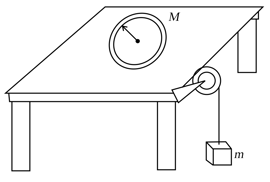


Important Questions on Rigid Body Dynamics: Part 2
In the arrangement shown, the double pulley has a mass and the two massless threads have been tightly wound on the inner (radius ) and outer circumference (radius ). The block shown has a mass . The moment of inertia of the double pulley system about a horizontal axis passing through its centre and perpendicular to the plane of the figure is . Find acceleration of the center of the pulley after the system is released.
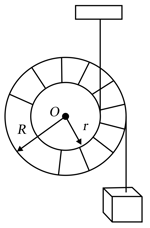
A uniform rod of mass and length which can rotate freely in vertical plane without friction, is hinged at its lower end on a table. A sphere of mass and radius is placed in contact with the vertical rod and a horizontal force is applied at the upper end of the rod.
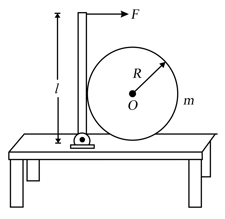
(a) Find the acceleration of the sphere just after the force starts acting.
(b) Find the horizontal component of hinge reaction acting on the rod just after force starts acting.
Find the tension in the tape and the linear acceleration of the cylinder up the incline, assuming there is no slipping. (Take and )
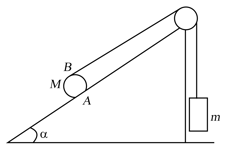
A rod of mass spins with an angular speed , Find its
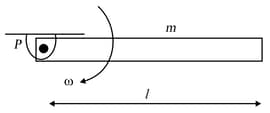
(a) kinetic energy of rotation.
(b) kinetic energy of translation
(c) total kinetic energy.
Find of the rotating composite rod comprising two rods of mass and and each of length . Assume rad and .
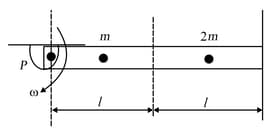
A rigid body is made of three identical uniform thin rods each of length fastened together in the form of letter The body is free to rotate about a fixed horizontal axis that passes through one of the legs of the The body is allowed to fall from rest from a position in which the plane of is horizontal. What is the angular speed of the body, when the plane of is vertical.
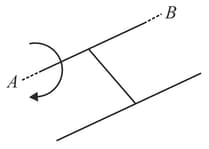
A uniform spherical shell of mass and radius rotates about a vertical axis on frictionless bearing. A massless cord passes around the equator of the shell, over a pulley of rotational inertia and radius and is attached to a small object of mass that is otherwise free to fall under the influence of gravity. There is no friction of pulley's axle; the cord does not slip on the pulley. What is the speed of the object after it has fallen a distance from rest? Use work-energy considerations.
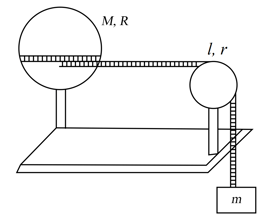
A uniform rod of length is released from rest such that it rotates about a smooth pivot. Find the angular speed of the rod when it becomes vertical.

